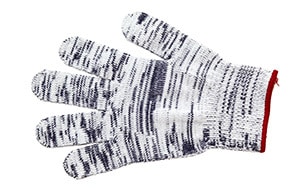Certification:


Product variants:




Size:
The sizes are differentiated by the colour of the border:
antiCUT® HT3

This glove is created from a special produced composite of polyethylene and polyamide fibres. In comparison with the glove manufactured from Aramid fibres it is substantially more both abrasion and cut resistant. They can be used advantageously for increased resistance to cuts and abrasions in cases where thermal resitance is not required (this especially affects durability), and also provide protection against the fall of sharp edges. AntiCut HT3 represent a more resistant version of AntiCut HT2 gloves.
The comparison table of values according to EN 388:2016
| Abrasion resistance: | class 3 (max. 4) |
| Cut resistence Coupe test: | class 3 (max. 5) |
| Tear resistance: | class 4 (max. 4) |
| Puncture resistance: | class X (max. 4) |
| Cut resistence TDM test: | class X (max. F) |
antiCUT® HT3

This glove is created from a special produced composite of polyethylene and polyamide fibres. In comparison with the glove manufactured from Aramid fibres it is substantially more both abrasion and cut resistant. They can be used advantageously for increased resistance to cuts and abrasions in cases where thermal resitance is not required (this especially affects durability), and also provide protection against the fall of sharp edges. AntiCut HT3 represent a more resistant version of AntiCut HT2 gloves.
The comparison table of values according to EN 388:2016
| Abrasion resistance: | class 3 (max. 4) |
| Cut resistence Coupe test: | class 3 (max. 5) |
| Tear resistance: | class 4 (max. 4) |
| Puncture resistance: | class X (max. 4) |
| Cut resistence TDM test: | class X (max. F) |
